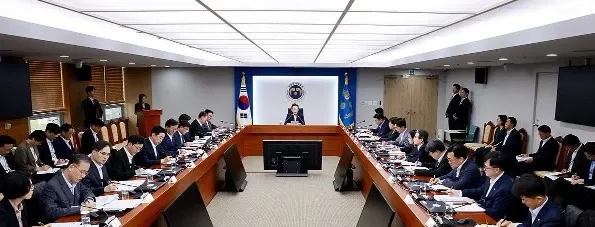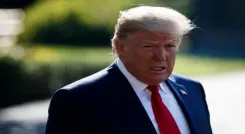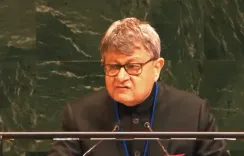How Will South Korean President Lee Reduce Excessive Corporate Penalties?

Synopsis
Key Takeaways
- Government task force to reduce excessive corporate penalties.
- Focus on easing regulatory burdens to enhance investment.
- Creation of a 100 trillion-won fund for innovative industries.
- Push for the Labour Union Act to strengthen worker rights.
- Increase in corporate tax rate amidst trade uncertainties.
Seoul, July 30 (NationPress) South Korean President Lee Jae Myung announced on Wednesday the initiation of a government task force aimed at reducing excessive penalties associated with corporate activities. This move is part of a strategy to lower regulatory barriers and stimulate investment.
President Lee presented various initiatives for what he termed a "pragmatic, market-driven" administration, including the relaxation of outdated regulations and the limitation of excessive penalties, while motivating companies to improve shareholder value.
"It is essential to tackle the issue of breach of trust charges being excessively enforced, which obstructs business operations," he remarked during a session of the emergency economic review task force.
"To ensure corporate management isn’t hindered by disproportionately harsh economic penalties, the government will swiftly establish a task force to rationalize these measures," he added.
Recognizing the rising concerns among business leaders regarding the threat of criminal penalties, President Lee stated that the administration will advocate for legislative and regulatory reforms in the upcoming session of the National Assembly.
To cultivate new avenues of growth, he urged the rapid establishment of a 100 trillion-won (approximately $72.4 billion) public-private fund to invest in emerging industries such as artificial intelligence and renewable energy.
He also stressed the significance of balanced regional development, pointing out the adverse effects of investment and resource concentration in the Seoul metropolitan area, as reported by Yonhap news agency.
These comments come amid increasing pressure on South Korean firms to enhance corporate governance following the recent implementation of the Commercial Act, which expands the fiduciary responsibilities of corporate board members to all shareholders.
The Lee administration is also advocating for the passage of the Labour Union Act, informally known as the "yellow envelope law", which aims to expand labor protections and prevent companies from seeking damages for legitimate union activities. This bill, previously vetoed by former President Yoon Suk Yeol, has resurfaced as a significant policy focus under the Lee government.
Adding to corporate anxieties, the government plans to increase the upper corporate tax rate to 25 percent from 24 percent amidst rising trade uncertainties influenced by US President Donald Trump's aggressive tariff policies.
During the meeting, President Lee urged a "drastic restructuring" of spending on ineffective projects and obligatory expenditures when preparing next year’s state budget, while ensuring adequate funding for key policy priorities, according to Kim Yong-beom, the presidential chief of staff for policy.
"President Lee emphasized that this is part of the process to normalize fiscal management, allowing government finances to act as a stimulus for economic recovery during a time when even standard fiscal operations have become challenging," Kim informed reporters.






